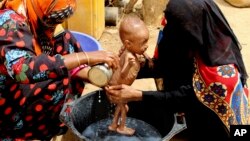While visiting Yemen two weeks ago, World Food Program Executive Director David Beasley met scores of skeletal children in an overcrowded hospital in the capital, Sana'a. He said the children he saw had a chance of survival. He also said he worried about the children he did not see, noting they had been sent home to die for lack of space to treat them.
Beasley said one child dies every 10 or 11 minutes in Yemen because of the humanitarian consequences of this brutal war. He said WFP could reach about 1 million of the estimated 2 million acutely malnourished children, but that there was no access to 1 million children living in mainly Houthi-controlled areas.
But Beasley said he hoped that conversations he and his team had with Houthi leaders during his visit would lead to a breakthrough, “because if we do not reach those million, they will die. We anticipate — I think it is 400,000 would die in the next few months if we do not get immediate access to those children. It is that realistic. It is that stark. It is that horrible."
Beasley said the country's economy was at the point of collapse after more than three years of war. He said 12 million people were starving and that food prices were skyrocketing in a country that is forced to import most of what it eats.
What gives him a modicum of hope that this debilitating war will end, he said, is the utter mental, spiritual and physical exhaustion of all the warring parties.
"From the ones I have talked to, they are yearning for a solution,” he said. “And let us hope that these peace talks that start tomorrow or the day after will yield to a path forward to provide us with some hope for the children of this country."
Currently, the World Food Program spends $100 million to feed 8 million people a month in Yemen. Beasley said the number of severely food-insecure people was expected to rise to 12 million, pushing costs up to $160 million a month.




